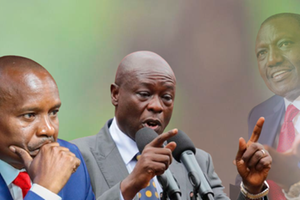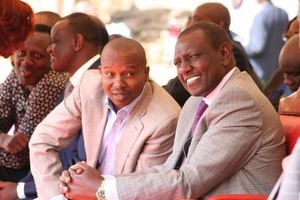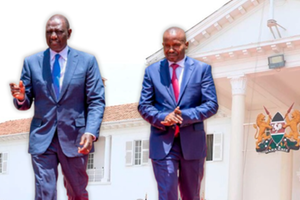Breaking News: Former Lugari MP Cyrus Jirongo dies in a road crash

Cabinet Secretary for Interior and National Administration Kithure Kindiki.
The nominee for the position of Kenya’s Deputy President, Professor Kithuri Kindiki, may have been thrust into the limelight as a lawyer when he became part of the legal team of President William Ruto, then the DP, when he faced trial at the International Criminal Court.
But his contribution to the general philosophy of international law precedes that. As a PhD student at the University of Pretoria, in South Africa, Prof Kindiki had pushed for reforms at the UN Security Council as well as changes in the way humanitarian interventions are done to warzones.
He wrote his thesis at a time when the African Union was transitioning from the Organisation of African Unity (OAU). It was titled: Humanitarian Intervention in Africa: The Role of Intergovernmental Organisations.
The OAU was a Pan-African bloc that strictly campaigned for the independence and unity of African states but never attempted to intervene in situations where State authorities were massacring their own people as had been witnessed in several countries during its time.
When AU was formed in 2002, one legal instrument and organ created was the protocol relating to the African Union Peace and Security Council, which would be the definitive body to deal with peace and security issues of the continent.
Mimicking the role of the UN Security Council, the AU Peace and Security Council would authorise interventions of military forces in situations where the security and safety of civilians were at risk.
But Prof Kindiki wrote his thesis long before that Protocol was formally adopted in 2005. There were gaps then.
Humanitarian intervention, according to UN Standards was a legal move, based on protecting the rights of civilians. But Prof Kindiki argued it had been mainly chaotic. The continent needed criteria, he argued, and all interventions had to take the primacy of the UN Security Council, which means that even if the African Union were to send troops to, say, Somalia, such missions must be authorised by the UN Security Council.
“The UN Security Council should authorise all instances of humanitarian intervention. Where the Council authorises a regional or sub-regional organisation to intervene, the Security Council should be updated on that mission regularly,” he argued.
The criteria for deployment, he added, should also emphasise preventive measures to be taken before the use of force by the mission, such as mediation or conciliation with local authorities.
“The use of force should be proportionate and should only be sufficient to address the gross human rights violations,” he wrote.
One problem with intervention forces has often been the indefinite stay, sometimes making the very civilians entirely dependent on their presence. Pof Kindiki’s view was that such missions should pack up and leave as soon as threats on civilians stop and should never try to change the political conditions in the target State.
However, such missions, he observed, must solely be charged with post-construction support, such as building the capacity of local authorities to re-establish themselves. Still, individual troops or personnel should be criminally liable for their violations.
Prof Kindiki’s biggest bone to pick, however, was the lethargy at the UN Security Council. He said there would be more efficiency if each of the five geographical regions of the world had five members on the Council.
The criticism of the UN Security Council, of course, predates Prof Kindiki’s thesis. The Council’s five permanent members: the US, China, the UK, Russia and France became veto-holders based on their economic might, war victory and population sizes by the end of World War II. However, they have retained their power on the 15-member Council even as more countries became richer or more populous.
“At least one permanent seat in the Council should be reserved for Africa. Reforming the UN Security Council will both give it the political legitimacy it needs and also make its decisions easier to implement,” Prof Kindiki wrote.
But he wrote that before the African Union formed the committee of 10 member states (also known as C10). The C10 has made various proposals to reform the UN Security Council, often aligning with other countries pushing for the same. But the P5s have often resisted. This year, the US said it would agree to give two permanent seats to Africa, however, none of them would have a veto.
One positive thing though, is that Prof Kindiki’s views then, align with his boss’s push for reforms now, at both the African Union and the UN Security Council.










